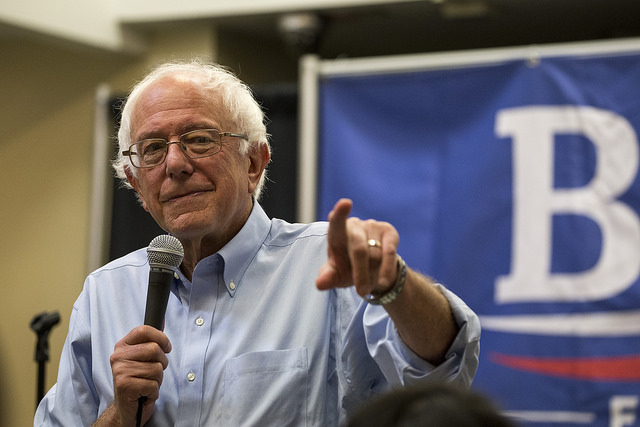Like this article? rabble is reader-supported journalism. Chip in to keep stories like these coming.
Speaking directly to American ideals, Bernie Sanders has emerged as a serious candidate to be the Democratic Party nominee for the U.S. Presidency.
Voicing ideas that resonate back to Thomas Jefferson, drafter of the American Declaration of Independence, Sanders vision of democracy connects with U.S. voters.
Casting himself as the leader of a needed political revolution, the Vermont Senator has chosen his campaign theme from American civics: every citizen is equal and the people chose the government.
His campaign pledges to restore the democratic heritage of the U.S., putting citizen voting rights in, and taking corporate money out; making higher education tuition free, and access to health care possible for all Americans.
When Sanders announced for the presidency in April of 2015, his support level was at three per cent. February 1, after a virtual tie in the Iowa Caucuses, it was clear Sanders was competitive with Hillary Clinton.
Sanders’ America video with Simon and Garfunkel playing and singing the title song sent a powerful message: a grassroots campaigner was running a professional campaign.
Young people responded to his indictment of American society for criminalizing minorities for pot offences, and letting bank fraudsters collect bonuses. Small donations flowed in large numbers fuelling his organization in primary states. Today polls show him a better choice for the Democrats than Hillary Clinton to defeat any eventual Republican nominee.
Five challenges await Sanders in his campaign to win the Democratic nomination and the subsequent November presidential election.
1. The Establishment Media began by ignoring his candidacy.
None offer to provide favourable analysis of his ideas. Comparisons of the coverage given to Republican Donald Trump and to Sanders show incredible disparity with Sanders getting 10 minutes of network news coverage while in the same time period Trump got 234 minutes. When Sanders won the New Hampshire primary, mainstream media focused on who would emerge to challenge Trump in the Republican race, not on what Sanders victory meant for American politics. After Sanders narrow loss in Nevada, the media line became Sanders will disappear and Hillary Clinton will soldier on to an inevitable victory.
2. His Age made it easy for the media to discount his candidacy.
Sanders will be 75 when the next president is sworn in, and 84 when a second term ends (if he were to be elected twice). Whatever the power of ageism, being 74 has not been a barrier to Sanders receiving massive support from young voters. Times of great stress often demand that distinguished elders’ step forward. Age is a component of traditional charismatic leadership; and there are precedents for people holding active positions of authority into their 80s, including American Supreme Court Justices, Senators, and other law makers.
3. His ideas propel his candidacy, but have no track record for rallying national support.
Calling yourself a democratic socialist, referring to the U.S. economy as rigged by Wall St., and American politics as dominated by the billionaire class in its own interest have no track record for rallying national support in opinion polls. Except that Sanders is popular because of his ideas, however strange that may appear to backers of corporate economics, and buyer-take-all politics. Sanders has identified a series of issues that make up his standard speech, and are the basis for his campaign. It is his ideas on those issues that have generated so much unexpected support. The first on the list is income and wealth inequality.
4. His religion, Jewish, makes him an outsider.
Sanders stands out in an age where Republican politics are dominated by aggressive Christian polemics, and Hillary Clinton refers to her “faith.” Not considered religious, Sanders lived on a kibbutz in Israel in the 1960s. When he refers to his spiritual beliefs, Sanders talks about how difficult it is to see other people living poorly because of injustice, and how the misery of others impedes more fortunate people like himself from living freely. When Sanders cites a religious figure it is usually the current Pope. In this campaign his religious background has not attracted much attention.
5. The Democratic party may not favour him out of party loyalty.
His political life began, unsuccessfully, in the 1970s outside the Democratic party with the Liberal Union, an anti-war group, and Sanders remained outside the Democratic party until launching his presidential bid. In 1981, he won the mayorship of Burlington, Vermont by 10 votes, with support from an independent coalition.
Though caucusing with Democrats, Sanders ran successfully as an independent socialist; serving in the U.S. House of Representatives (1990-2005) and elected twice (2006, 2012) a U.S. Senator. He chose to enter the Democratic contest so as to debate the other candidates and not have to waste time and energy getting on the ballot in 50 states.
The downside is that the Democratic party provides for the appointment of “super-delegates” to the nominating convention. The candidate will be selected, not just by regular delegates chosen in primary elections and pledged to one candidate, but also by these super-delegates. They include party officials, past and present, and Democratic office-holders.
As many as 15 per cent of all delegates could be in this group and they can not be expected to favour Sanders out of party loyalty. Sanders could win over 50 per cent of the primary delegates and lose the nomination because of this group.
Duncan Cameron is the president of rabble.ca and writes a weekly column on politics and current affairs.
Photo: flickr/ Phil Roeder



